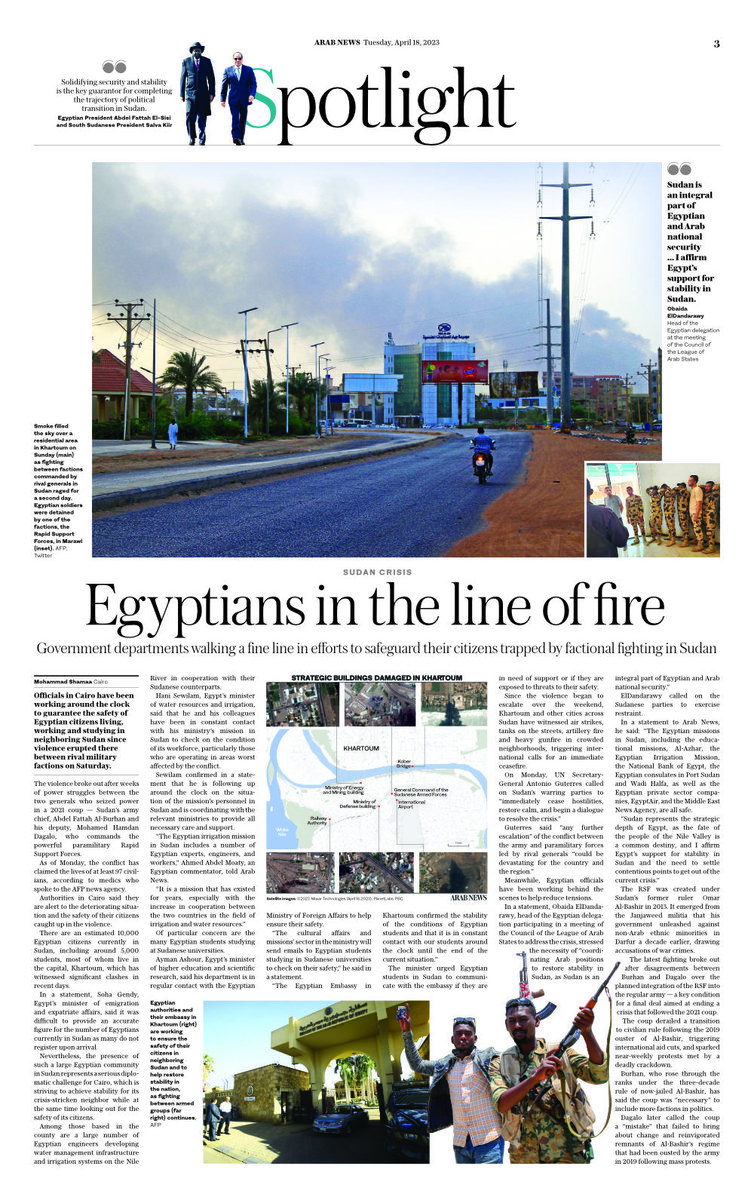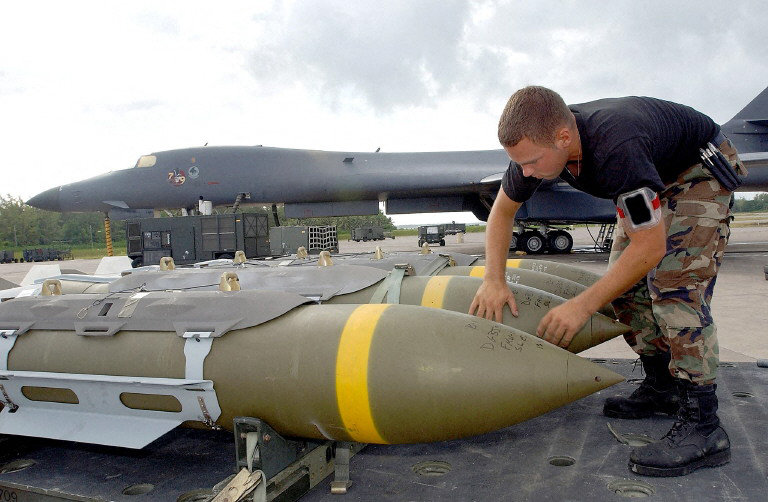CAIRO: Officials in Cairo say they have been working around the clock in recent days to guarantee the safety of Egyptian citizens living, working, and studying in neighboring Sudan since violence erupted there between rival military factions on Saturday.
The violence broke out after weeks of power struggles between the two generals who seized power in a 2021 coup — Sudan’s army chief, Abdel Fattah Al-Burhan and his deputy, Mohamed Hamdan Dagalo, who commands the powerful paramilitary Rapid Support Forces.
As of Monday, the conflict has claimed the lives of at least 97 civilians, according to medics who spoke to the AFP news agency. Authorities in Cairo say they are alert to the deteriorating situation and the safety of their citizens caught up in the violence.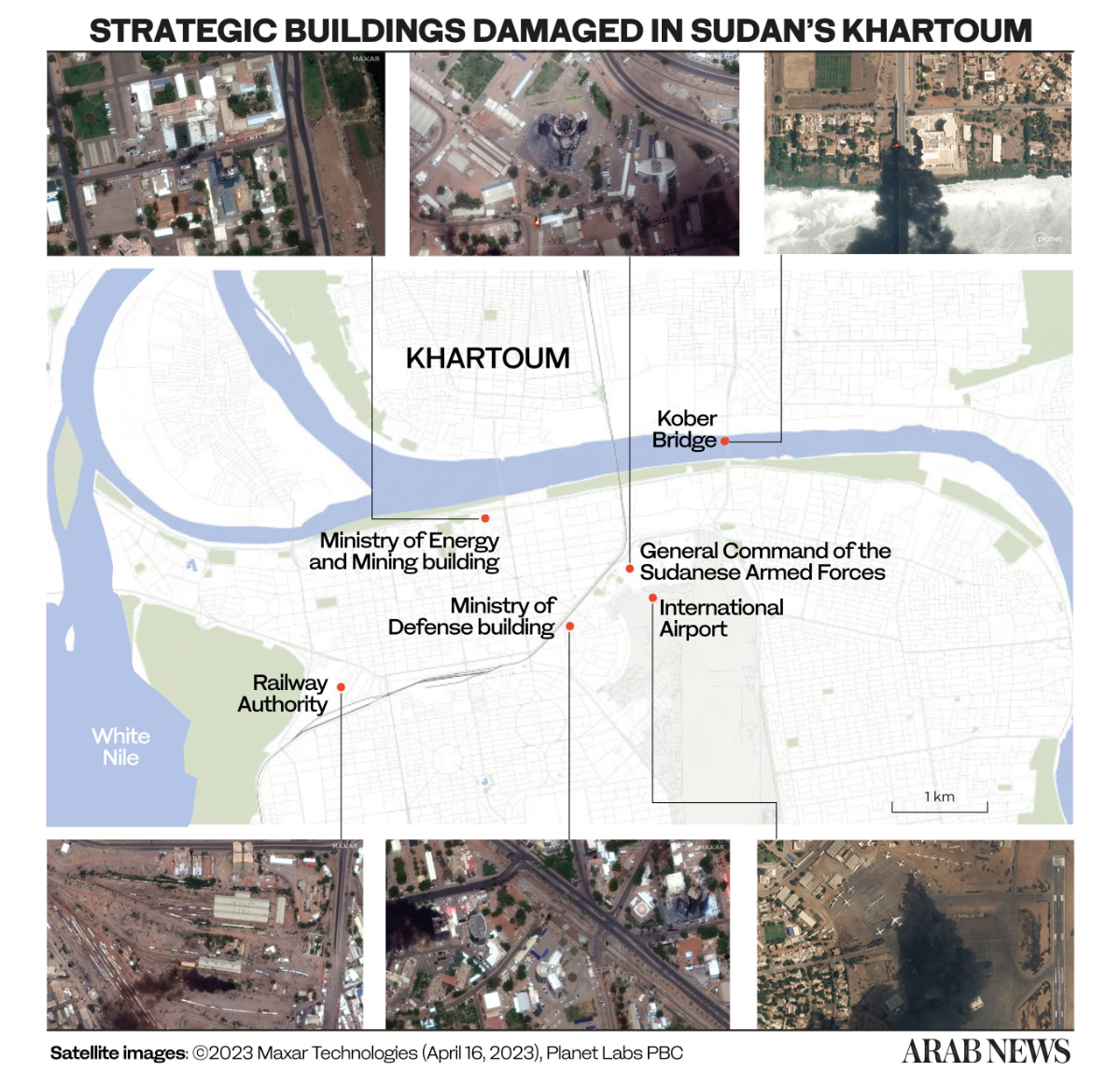
There are an estimated 10,000 Egyptian citizens currently in Sudan, including around 5,000 students, most of whom live in the capital, Khartoum, which has witnessed significant clashes in recent days.
In a statement, Soha Gendy, Egypt’s minister of emigration and expatriate affairs, said it was difficult to provide an accurate figure for the number of Egyptians currently in Sudan as many do not register upon arrival.
Sudan is an integral part of Egyptian and Arab national security ... I affirm Egypt’s support for stability in Sudan.
Obaida ElDandarawy, Head of the Egyptian delegation at the meeting of the Council of the League of Arab States
Nevertheless, the presence of such a large Egyptian community in Sudan represents a serious diplomatic challenge for Cairo, which is striving to achieve stability for its crisis-stricken neighbor while at the same time looking out for the safety of its citizens.
Among those based in the county are a large number of Egyptian engineers developing water management infrastructure and irrigation systems on the Nile River in cooperation with their Sudanese counterparts.
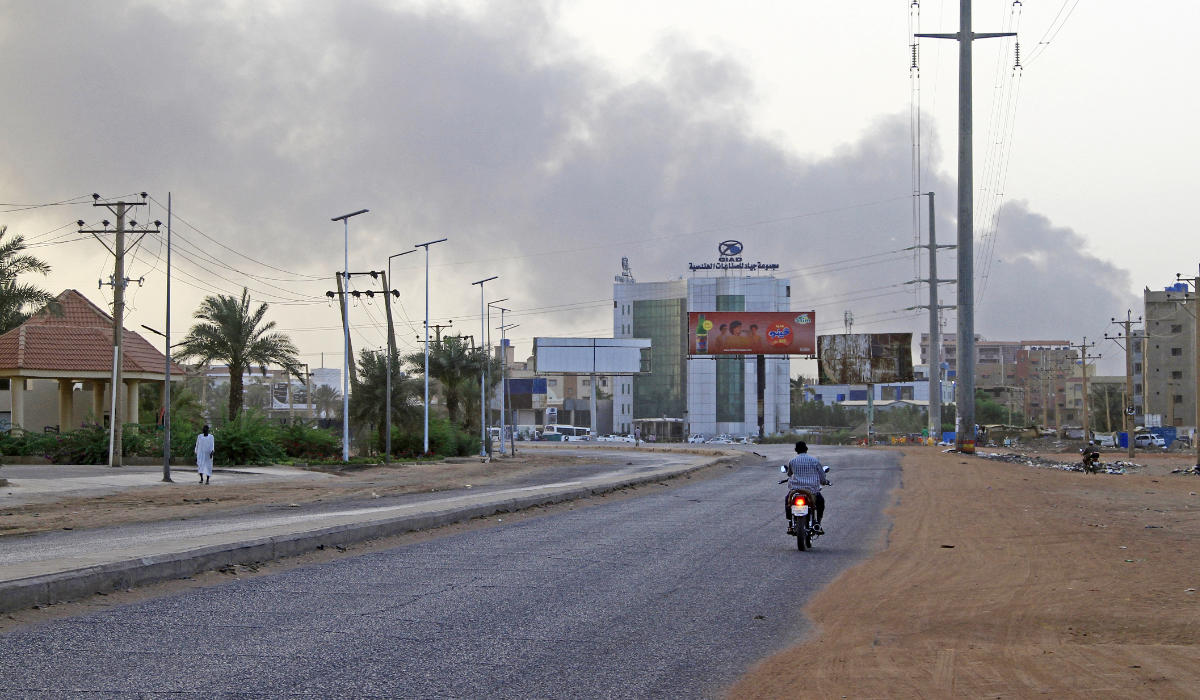
Smoke filled the sky over a residential area in Khartoum on Sunday as fighting between factions commanded by rival generals in Sudan raged for a second day. (AFP)
Hani Sewilam, Egypt’s minister of water resources and irrigation, says he and his colleagues have been in constant contact with his ministry’s mission in Sudan to check on the condition of its workforce, particularly those operating in areas of conflict.
Sewilam confirmed in a statement that he is following up around the clock on the situation of the mission’s personnel in Sudan and is coordinating with the relevant ministries to provide all necessary care and support.
“The Egyptian irrigation mission in Sudan includes a number of Egyptian experts, engineers, and workers,” Ahmed Abdel Moaty, an Egyptian commentator, told Arab News.

This picture taken on April 16, 2023, shows Sudanese army soldiers, loyal to army chief Abdel Fattah al-Burhan, posing for a picture at the Rapid Support Forces (RSF) base in the Red Sea city of Port Sudan. (AFP)
“It is a mission that has existed for years, especially with the increase in cooperation between the two countries in the field of irrigation and water resources.”
Of particular concern are the many Egyptian students studying at Sudanese universities.
Ayman Ashour, Egypt’s minister of higher education and scientific research, said his department is in regular contact with the Egyptian Ministry of Foreign Affairs to help ensure their safety.
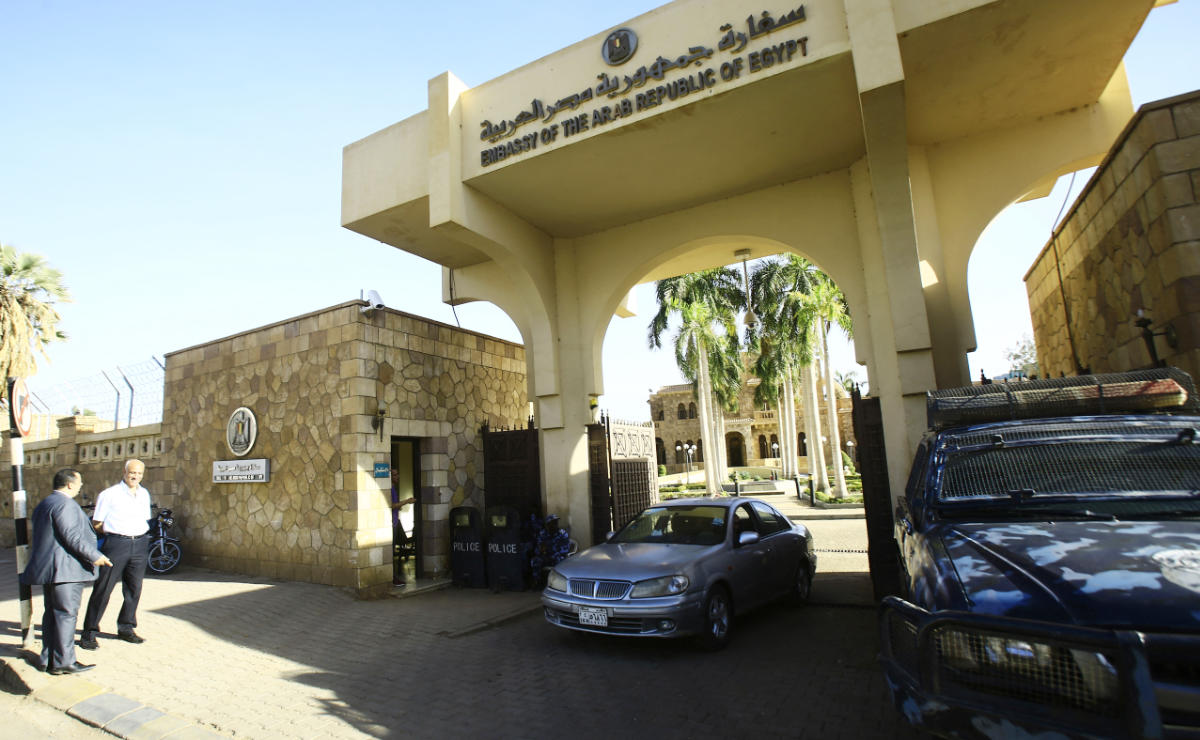
Egyptian authorities and their embassy in Khartoum are working to ensure the safety of their citizens in neighboring Sudan and to help restore stability in the nation, as fighting between armed groups continues. (AFP)
“The cultural affairs and missions’ sector in the ministry will send emails to Egyptian students studying in Sudanese universities to check on their safety,” he said in a statement.
“The Egyptian Embassy in Khartoum confirmed the stability of the conditions of Egyptian students and that it is in constant contact with our students around the clock until the end of the current situation.”
The minister urged Egyptian students in Sudan to communicate with the embassy if they are in need of support or if they are exposed to threats to their safety.
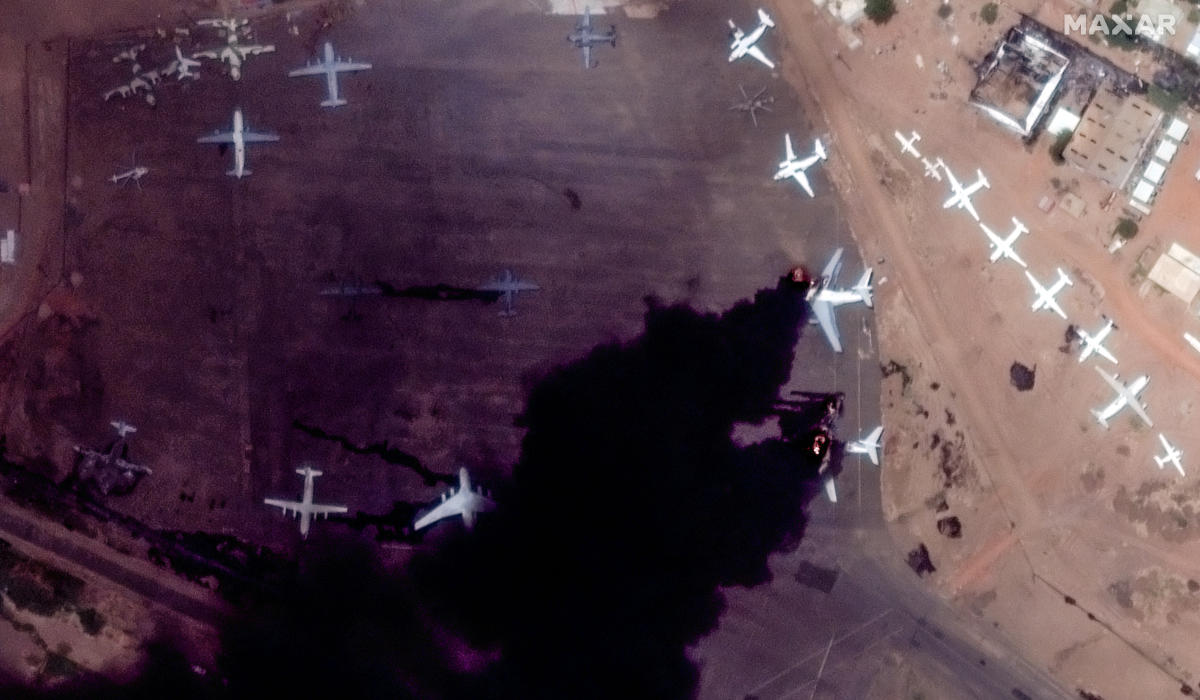
This handout satellite image courtesy of Maxar Technologies taken on April 16, 2023 shows two Il-76 transport aircraft on fire and several additional planes have been damaged at the Khartoum International Airport. (AFP)
Since the uptick in violence began over the weekend, Khartoum and other cities across Sudan have witnessed air strikes, tanks on the streets, artillery fire and heavy gunfire in crowded neighborhoods, triggering international calls for an immediate ceasefire.
On Monday, UN Secretary-General Antonio Guterres called on Sudan’s warring parties to “immediately cease hostilities, restore calm, and begin a dialogue to resolve the crisis.”
Guterres said “any further escalation” of the conflict between the army and paramilitary forces led by rival generals “could be devastating for the country and the region.”
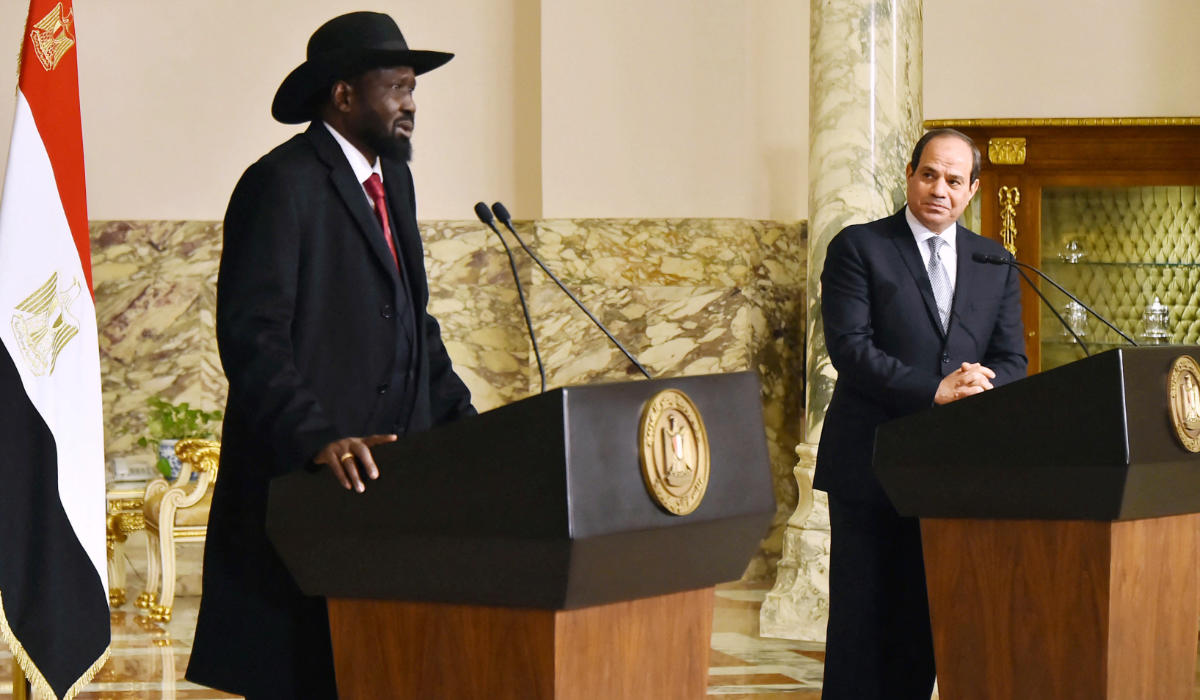
A handout picture released by the Egyptian Presidency on January 17, 2019 shows the visiting President of South Sudan Salva Kiir Mayardit (L) speaking as he gives a press conference with Egyptian President Abdel Fattah al-Sisi at the presidential palace in the capital Cairo. (AFP)
Meanwhile, Egyptian officials have been working behind the scenes to help reduce tensions.
In a statement, Obaida ElDandarawy, head of the Egyptian delegation participating in a meeting of the Council of the League of Arab States to address the crisis, stressed the necessity of “coordinating Arab positions to restore stability in Sudan, as Sudan is an integral part of Egyptian and Arab national security.”
ElDandarawy called on the Sudanese parties to exercise restraint.
Solidifying security and stability is the key guarantor for completing the trajectory of political transition in Sudan.
Egyptian President Abdel Fattah El-Sisi and South Sudanese President Salva Kiir
In a statement to Arab News, he said: “The Egyptian missions in Sudan, including the educational missions, Al-Azhar, the Egyptian Irrigation Mission, the National Bank of Egypt, the Egyptian consulates in Port Sudan and Wadi Halfa, as well as the Egyptian private sector companies, EgyptAir, and the Middle East News Agency, are all safe.
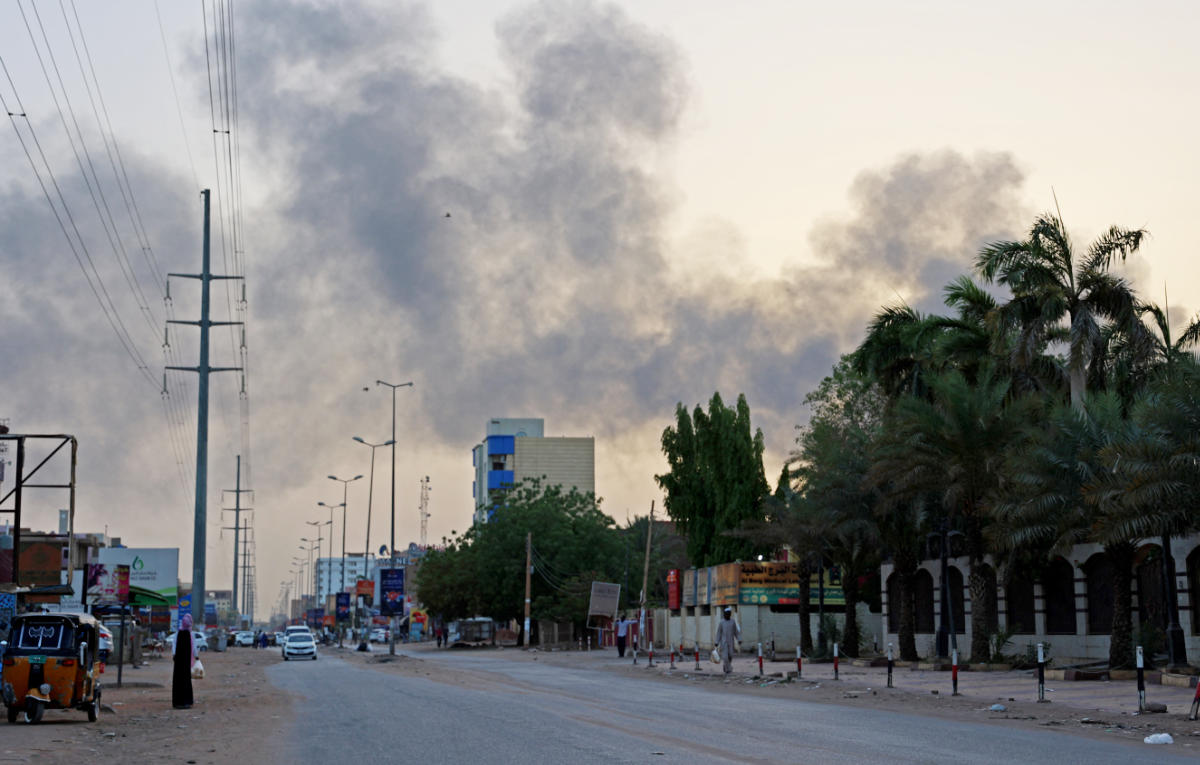
Smoke billows above residential buildings in east Khartoum on April 16, 2023, as fighting in Sudan raged for a second day in battles between rival generals. (AFP)
“Sudan represents the strategic depth of Egypt, as the fate of the people of the Nile Valley is a common destiny, and I affirm Egypt’s support for stability in Sudan and the need to settle contentious points to get out of the current crisis.”
In a phone call on Monday, Ahmed Aboul Gheit, secretary-general of the Arab League, spoke to Abdalla Hamdok, the former prime minister of Sudan removed in the 2021 coup, during which they exchanged views on the current crisis and ways to stop military confrontations in the country.
According to his spokesperson, Aboul Gheit told Hamdok that escaping the current crisis will require all components of the political spectrum, whether civilians or military, to unite and work together in the public interest.
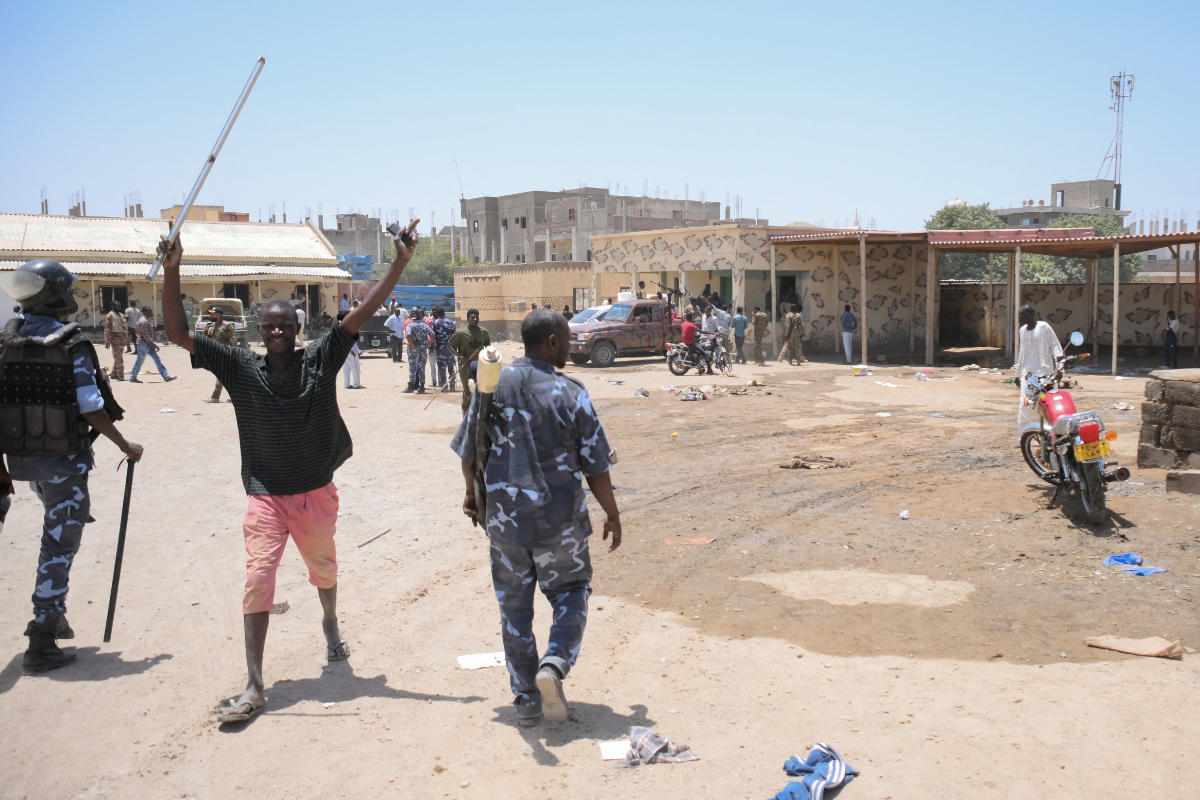
This picture taken on April 16, 2023, shows Sudanese army soldiers, loyal to army chief Abdel Fattah al-Burhan, inspecting the Rapid Support Forces (RSF) base in the Red Sea city of Port Sudan. (AFP)
Aboul Gheit agreed with Hamdok on the priority of de-escalation, the immediate cessation of armed clashes, ensuring the security of the civilian population, and restoring calm, and emphasizing that all problems can be addressed through dialogue.
On Sunday, Aboul Gheit also spoke to Guterres, during which he discussed ways of coordination between the Arab League and the UN in dealing with the ongoing crisis in Sudan.
The RSF was created under Sudan’s former ruler Omar Al-Bashir in 2013. It emerged from the Janjaweed militia that his government unleashed against non-Arab ethnic minorities in Darfur a decade earlier, drawing accusations of war crimes.
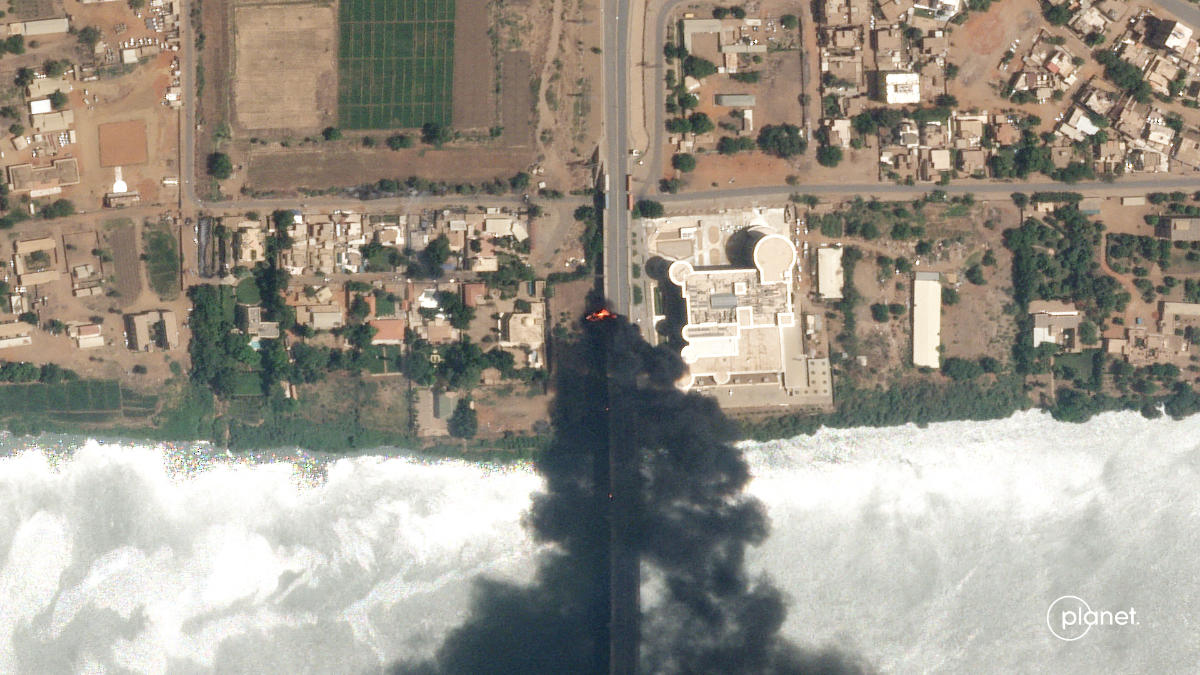
This handout aerial SkySat image captured and released on April 16, 2023, by Planet Labs PBC, shows damage and a fire on the Kobar Bridge in Khartoum. (Supplied)
The latest fighting broke out after disagreements between Burhan and Dagalo over the planned integration of the RSF into the regular army — a key condition for a final deal aimed at ending a crisis since the 2021 coup.
The coup derailed a transition to civilian rule following the 2019 ouster of Al-Bashir, triggering international aid cuts and sparked near-weekly protests met by a deadly crackdown.
Burhan, who rose through the ranks under the three-decade rule of now-jailed Al-Bashir, has said the coup “necessary” to include more factions in politics.
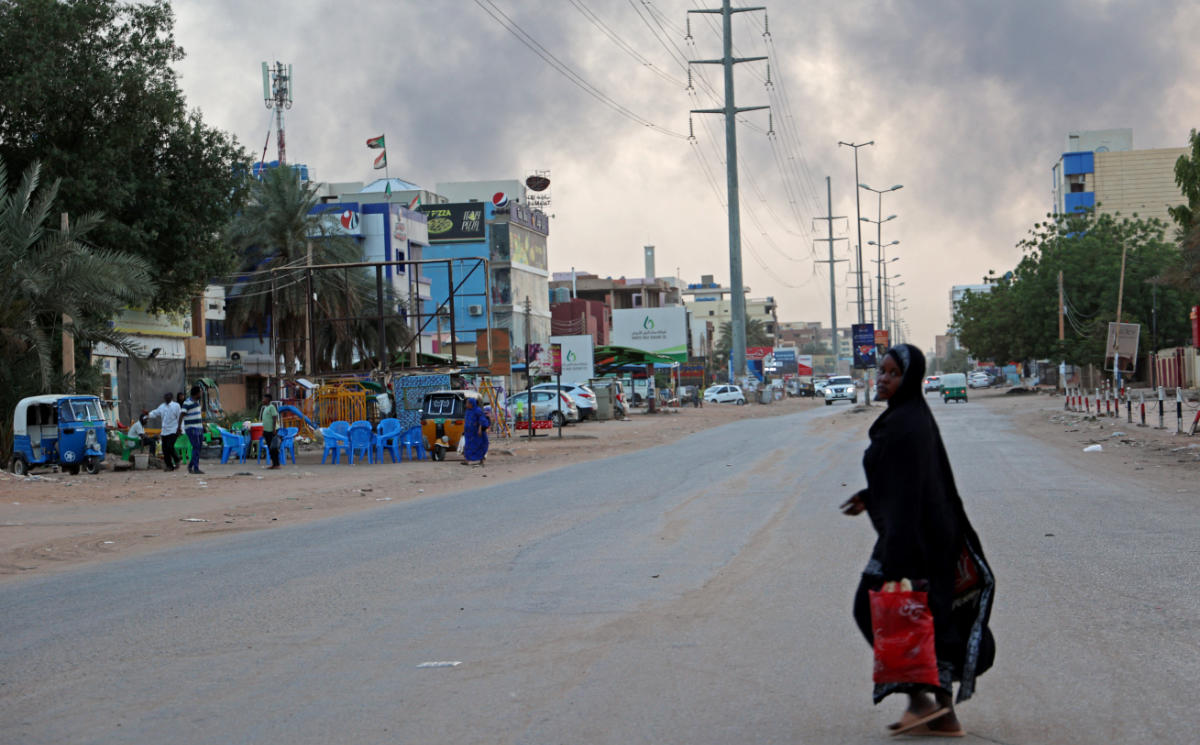
Smoke billows above residential buildings in east Khartoum on April 16, 2023, as fighting in Sudan raged for a second day in battles between rival generals. (AFP)
Dagalo later called the coup a “mistake” that failed to bring about change and reinvigorated remnants of Al-Bashir’s regime ousted by the army in 2019 following mass protests.
The two sides accuse each other of starting the fighting, and both claim to be in control of key sites, including the airport and the presidential palace.
On Monday, the RSF claimed on its social media accounts to have taken control of Merowe Airport, about 350 km north of Khartoum.
INNUMBER
• 97 Civilians killed in the conflict as of Monday, according to medics
“The strategic goal of the Rapid Support Forces in Merowe is not the airport, but rather the Merowe Dam,” Hassan Al-Saouri, a Sudanese political expert and professor of political science, said in a statement circulated by activists on social media.
“It is true that Merowe Airport is the alternative to Khartoum International Airport, but the Rapid Support Forces seem to be targeting the Merowe Dam specifically, given that it works to guard it and therefore can control it, stop it, and form an economic blockade by striking energy as it controls water in the northern region of Sudan, which is an important, vital, and strategic area for Sudan.”
